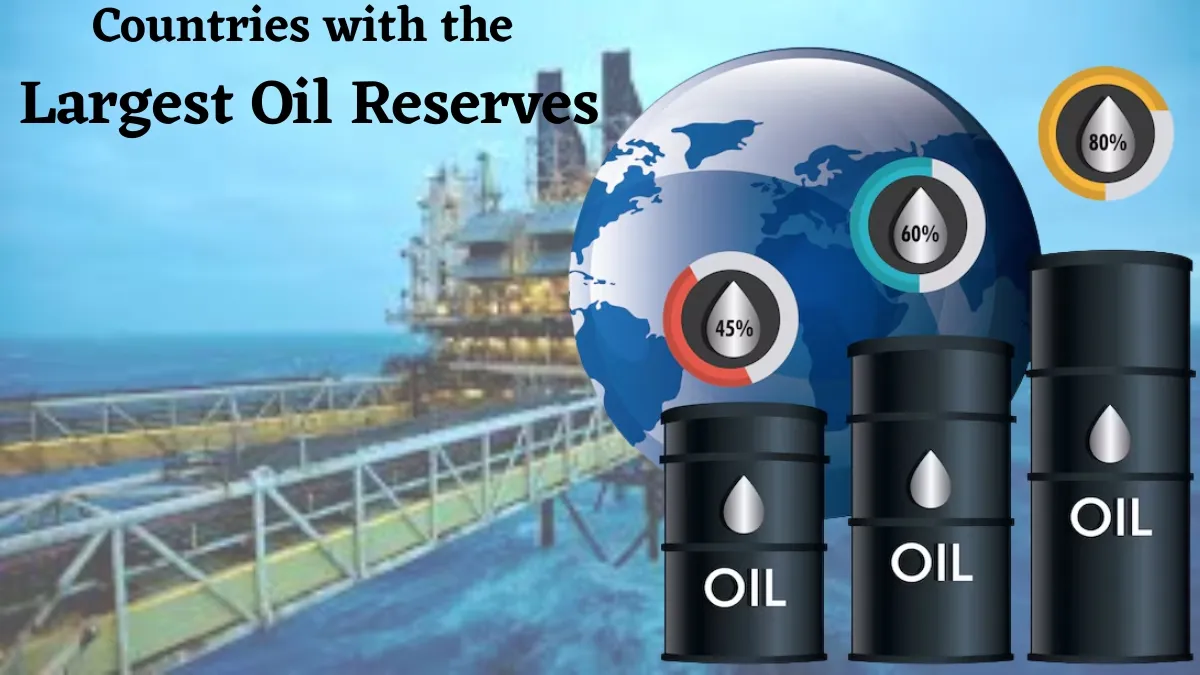Crude oil is one of the most important natural resources in the world, as it is an essential component of industrial growth, international trade and worldwide energy consumption. So, the top countries with the largest oil reserves play an important role in economic growth worldwide and affect international policy and energy markets.
So, considering all these things, we will look at the Top 10 Countries with the Largest Oil Reserves with their strategic importance and their positions within groups like OPEC+ and the Organisation of the Petroleum Exporting Countries (OPEC) in the article.
Here is the list of the Top 10 Countries with the Largest Oil Reserves
| ~ | Country | Proven Oil Reserves (Billion Barrels) | OPEC Membership |
| 1. | Venezuela | 303 | Yes |
| 2. | Saudi Arabia | 267 | Yes |
| 3. | Iran | 209 | Yes |
| 4. | Canada | 163 | No |
| 5. | Iraq | 145 | Yes |
| 6. | UAE | 113 | Yes |
| 7. | Kuwait | 102 | Yes |
| 8. | Russia | 80 | OPEC+ |
| 9. | United States | 74 | No |
| 10. | Libya | 48 | Yes |
A brief overview of the top countries with the largest oil reserves
1. Venezuela – 303 Billion Barrels
OPEC Member: Yes,
Venezuela tops the chart with the world’s largest oil reserves. The catch? Much of it is locked up in extra-heavy crude, which is expensive and tricky to refine. Add years of political chaos, U.S. sanctions, and decaying infrastructure, and production has plunged, making it a classic case of potential vs. reality.
2. Saudi Arabia – 267 Billion Barrels
OPEC Member: Yes,
Saudi Arabia is the big boss in the oil world. With easy-to-access oil fields and a well-oiled system (pun intended), it’s not just rich in oil — it’s rich because of oil. The kingdom can turn the taps on or off faster than most, giving it enormous sway in global oil markets.
3. Iran – 209 Billion Barrels
OPEC Member: Yes,
Iran has massive reserves, especially near the Persian Gulf. But sanctions, especially from the U.S., have made it tough to cash in fully. Limited access to international markets and technology has kept much of its potential untapped, though it still plays a key role in regional politics and OPEC decisions.
4. Canada – 163 Billion Barrels
OPEC Member: No
Canada’s oil story is all about oil sands. Found mostly in Alberta, these reserves are thick, sticky, and harder to extract — but Canada’s been doing it anyway. With strong trade ties to the U.S. and cutting-edge technology, Canada is a heavyweight in the oil world, even without an OPEC seat.
5. Iraq – 145 Billion Barrels
OPEC Member: Yes,
Iraq has some of the most easily extractable oil in the world, mostly in the south. Despite decades of war and instability, it remains a major oil producer. Oil exports fund most of its economy, and Iraq continues to play an active, sometimes unpredictable, role in OPEC dynamics.
6. United Arab Emirates (UAE) – 113 Billion Barrels
OPEC Member: Yes
The UAE — especially Abu Dhabi — has invested smartly in modern oil infrastructure. Its reserves are large, but it’s the country’s forward-thinking approach and diversified economy that stand out. It’s a stable and influential member of OPEC with ambitions that go beyond just pumping oil.
7. Kuwait – 102 Billion Barrels
OPEC Member: Yes
Small in size, big in oil. Kuwait’s reserves are among the easiest and cheapest to extract. Its oil fields have been a steady source of income for decades, and the country remains one of OPEC’s most consistent producers.
8. Russia – 80 Billion Barrels
OPEC Member: OPEC+
Russia isn’t part of OPEC, but it's part of the extended team known as OPEC+. As one of the world’s largest producers, Russia’s oil game is strong. Despite sanctions and geopolitical headwinds, it continues to sell energy to key partners — especially in Asia — and wields significant influence in global energy politics.
9. United States – 74 Billion Barrels
OPEC Member: No
The U.S. oil story is all about innovation. While it has fewer reserves than others on this list, it leads the world in production thanks to the shale oil boom and fracking. The U.S. isn’t part of OPEC — and likely never will be — but it’s a critical player that often shifts market dynamics.
10. Libya – 48 Billion Barrels
OPEC Member: Yes,
Libya has Africa’s largest oil reserves and great geographical positioning near Europe. But its political instability has made consistent production nearly impossible. When the country is stable, its oil flows. When conflict flares, things shut down, making Libya a wild card in the global oil game.
Conclusion
While having large oil reserves is a significant asset, it doesn’t automatically translate into wealth or influence. Political stability, access to technology, foreign investment, and membership in groups like OPEC or OPEC+ often determine how well these resources are used. These top 10 countries collectively shape the future of global energy—some with the power to influence prices, others with the potential to rise if circumstances allow.

Comments
All Comments (0)
Join the conversation